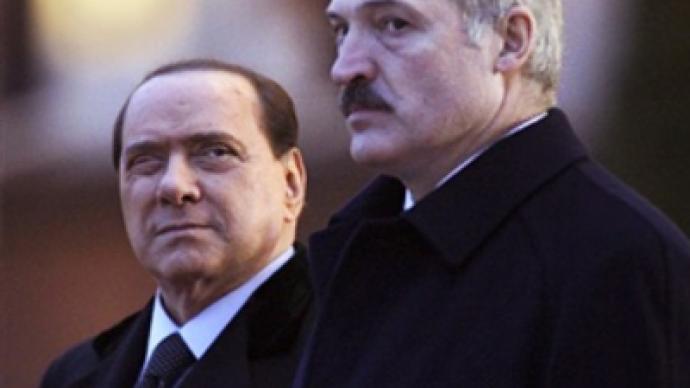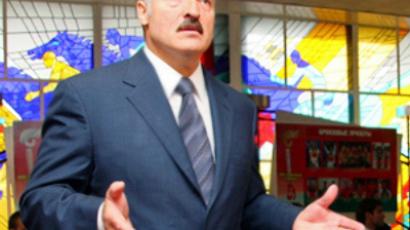Belarusian pie - take your bite

Italian prime-minister Silvio Berlusconi’s business instincts have led him to Minsk - the first leader of a Western country in more than a decade to visit Belarus.
Certainly, there is no queue of politicians lining up to get to Minsk and not even any information of any other Western leader planning to visit this Russian neighbor, while Berlusconi’s trip was announced after his dinner with Aleksandr Lukashenko in Rome earlier this year.
There are no signs of a European thaw towards Belarus, either. But, Berlusconi’s reputation will hardly suffer from a meeting with the “last dictator of Europe”, even on Belarusian turf. And it seems that it was not the Berlusconi-politician, but rather the Berlusconi-businessman that we saw in Minsk this week.
Staking on countries in Europe’s outskirts, the Italian billionaire media magnate is successful in building commercial and energy ties, chiefly with Russia, Libya and Turkey. And now he is casting a glance at Belarus.
“They have come first. Those who come first, naturally, get better terms.”
- Aleksandr Lukashenko.
During his recent visit to Russia, Berlusconi was lobbying for Russian contracts for Italian aerospace and defense company Finmeccanica, and obviously he did the same in Minsk – Finmeccanica signed a memorandum of understanding with the Belarusian government on cooperation in the field of transport, energy, space and defense systems.
It is worth saying that Italian businessmen coming to Belarus count not only on the tiny 9.8 million people in the Belarusian market. They also go for the 170 million joint market of the Customs Union approved by Presidents of Belarus, Kazakhstan and Russia just three days before Berlusconi’s visit.
Besides this, Aleksandr Lukashenko’s proposal of better terms for those who “come first” looks really promising in the wake of the privatization process expected to break out in 2010. Under the conditions of the IMF-Belarus loan agreement, the Belarusian side will have to sell at least six major state-owned enterprises over the next year. At the moment the list includes country’s largest telecommunication company Beltelecom. As the world crisis is far from showing signs of an end, the Minsk authorities might as well sell more to gain money and keep the economy away from bankruptcy.
Looking for a friendly shoulder
Surely, Berlusconi’s visit might be looked at as the first real step towards bringing Belarus-EU relations to a new level. After the end of isolation this year, as Belarus was invited to the EU Eastern Partnership program, the Belarusian president made two visits to EU countries. The visit from the other side could symbolize Brussels’ readiness to further improve relations.
“To lean on Italy, on such a politician [as Silvio Berlusconi – RT] is a big deal. Cooperation with Italian partners is very beneficial for Belarus.”
– Aleksandr Lukashenko.
However, the Belarus-Italy talks were mostly business talks, and cooperation with Italy, and Finmeccanica in particular, opens up an interesting perspective for Belarus in a number of directions.
First, this might set up a pattern of cooperation that perfectly fits Aleksandr Lukashenko’s standards: economy first and economy next – no blah-blah-blah about human rights, democracy and things like that. From now on, the Belarusian leader will have a good example to refer to while discussing the terms of Belarus-EU cooperation with Brussels, or whatever other European capital.
Second, fully-fledged and equitable Belarus-Italy cooperation in machine-building, military industry, energy and transportation might open a way for Minsk to economic integration with Europe, based on modernization of national industry.
While building up the Customs Union with Russia (and Kazakhstan) Lukashenko is desperately looking for the way to “diversify” his country’s economy – that is, to make it less dependent on Russia. Up to now, the only perspective of European integration perceived as realistic (and simultaneously unacceptable) in Minsk was inseparably connected with deindustrialization and other “shocking” procedures well-known in Eastern Europe. Lack of opportunities for entering European economic space with undamaged heavy industry has been the major obstacle for Belarus-EU rapprochement. If agreements with Italy and Finmeccanica proposed transferring Italian technologies and modernizing Belarusian industry, they might remove that problem and boost Lukashenko’s European policy.
But one could hardly imagine Silvio Berlusconi coming to Belarus with the noble mission of saving the post-Soviet economy from collapse by promoting its industrial development. In a time of crisis, when global demand is falling and machine-building is suffering the worst recession Italian business needs nothing else but new consumers for their production.
Besides, it is quite possible that Italian prime minister’s activities in Minsk were coordinated with Silvio’s “big friend” Vladimir Putin, who had a couple of very intensive meetings with Berlusconi this autumn. That is why it might well turn out that Italian investments coming to Belarus in 2009–2010 will in fact be Russian investments which found a longer but safer way to Belarusian state property via Italy.
Whatever interests and plans were behind the luster and smiles of the meeting in Minsk, this show in itself was an achievement for Belarus.
Darya Sologub for RT














